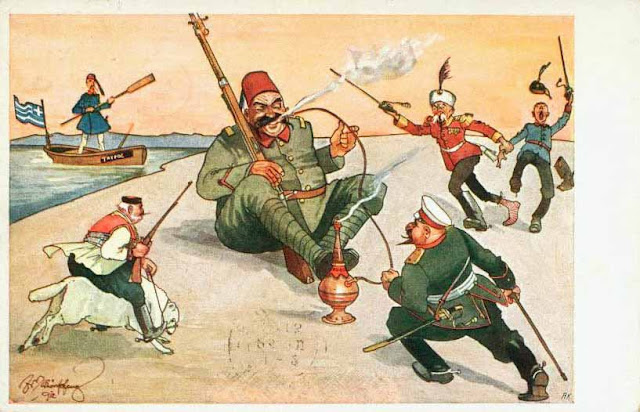
Here are some extracts showing how British officers and government officials viewed Turkey and the Turkish people during the early twentieth century. Prejudice and hatred reeks in their thoughts and actions:
- Colonel Rawlinson, a British intelligence officer, viewed Turkey as: “the land of ignorant Oriental populations[i]“
- Rawlinson’s Turks ‘were a pathetic people whose brilliance reveals nothing but their own emptiness’. He was convinced that he was there “to make the Turk smell hell”.[ii]
- According to Rawlinson, the Turks were, “cunning old barbarians”.[iii]
- One report states that his faithful dog, ‘George’, was surprised when he saw the British sailors at the end of the captivity, because they “were so kind and friendly”, “they were evidently not Turks”[iv].
British Guile and Strong-arm tactics during the Lausanne Conference:
- A report sent on 23 December 1922 by Ismet Innonu, the Turkish Foreign Minister representing Turkey during the Lausanne Conference, which was intercepted by British intelligence, offers an insight into the way the European powers treated the Turkish government. The Allies, Ismet observed, “are extremely tiresome and annoying and by their method of discussion they wish to cow down the Turk and on the other hand drag him gradually into a quagmire by throwing him into discussions over rotten and insolent demands. in almost every question we have our backs to the wall. Either they will bring us to our knees and conclude another form of Sevres Treaty or we will bring them to theirs. We are determined to conclude a peace like every other civilized and independent nation.”[v]
- The British Foreign Office reaction to Ismet’s observations was dismissive. The Turks were suffering from ‘delusion and fanaticism’ against which nothing would avail but ‘force or fear’.[vi]
- ‘To Lloyd George (British PM) Mustafa Kemâl was simply a bandit, and to Curzon Ismet was a carpetmonger’.[vii]
- Lord Curzon’s views of the Turks during the Lausanne conference: “these impossible people who seem to combine the intelligence of an undeveloped child with the indurated obstinacy of the mule”[viii]
[i] Cambridge, Churchill College Archive Center; De Robeck Papers, DRBK 6/1, p. 307. Quoted in ‘The Illicit Adventures Of Rawlinson- British Intelligence in the Final Phase of the Ottoman Empire’, by Bülent Gökay, The Turkish Yearbook Vol. XXIII, p.98
[ii] Ibid., p. 16. Quoted in ‘The Illicit Adventures Of Rawlinson- British Intelligence in the Final Phase of the Ottoman Empire’, by Bülent Gökay, The Turkish Yearbook, Vol. XXIII, p.98
[iii] Ibid., p. 339. Quoted in ‘The Illicit Adventures Of Rawlinson- British Intelligence in the Final Phase of the Ottoman Empire’, by Bülent Gökay, The Turkish Yearbook, Vol. XXIII, p.98
[iv] Ibid., p. 353. Quoted in ‘The Illicit Adventures Of Rawlinson- British Intelligence in the Final Phase of the Ottoman Empire’, by Bülent Gökay, The Turkish Yearbook, Vol. XXIII, p.98
[v] S.R. Sonyel, Turkish Diplomacy: 1916-1923, Mustafa Kemal and the Turkish National Movement, Beverley Hills, 1975, p 209. Quoted in Secret Intelligence At Lausanne, Keith Jeffrey and Alan Sharp, The Turkish Yearbook, Vol. XXIII, p. 84
[vi] Ibid., p. 84
[vii] Dockrill and Goold op. cit., p. 251. Quoted in, Secret Intelligence At Lausanne, Keith Jeffrey and Alan Sharp, The Turkish Yearbook, Vol. XXIII, p. 86
[viii] DBF P Curzon to Crowe, tel 210, 15 January 1923, no. 327, p. 449. Quoted in, Britain And The Lausanne Conference: 1922-1923, by Michael Dockrill, The Turkish Yearbook, Vol. XXIII, p. 8

Leave A Comment